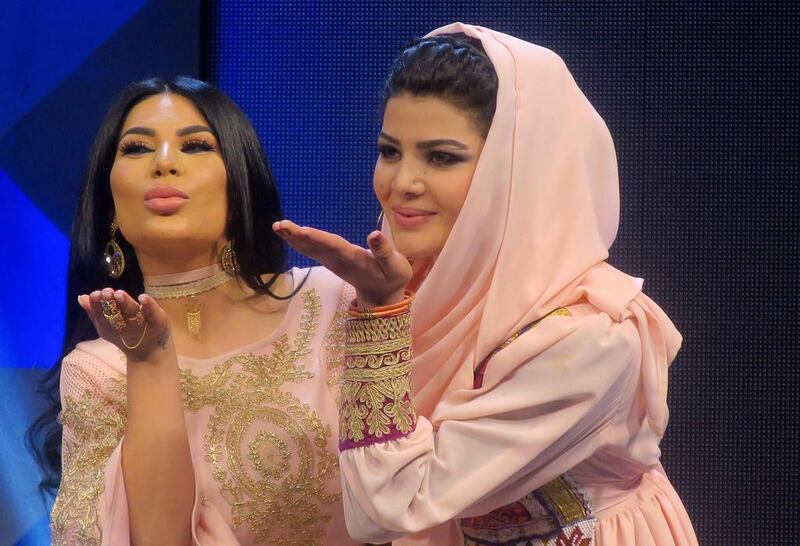Kabul // Zulala Hashemi has already gone farther than any other woman on Afghan Star: on Monday, the 18-year-old faces off against a rapper in the final of the popular television music talent show.
Her achievement in Afghanistan’s male-dominated and conservative society is all the more remarkable given that she comes from eastern Jalalabad, a stronghold of Taliban and ISIL insurgents.
Zulala's rival is the first rapper to take part in Afghan Star, so Monday's show promises to be one of the most trailblazing finales in its 12-year history.
Quietly rooting for Zulala is the Afghan pop singer Aryana Saeed, one of the judges and an indefatigable women’s rights activist.
Aryana, who was born in Kabul and now lives in London, is frequently compared to the American reality star Kim Kardashian and is despised by religious conservatives for her figure-hugging clothes.
Zulala and Aryana greet each other with a hug in a studio of the Afghan television station Tolo.
“I have never hidden my support as women have little chance in this country,” says Aryana. “For the first time people have voted for a girl – and one who comes from a very conservative province, a land of [ISIL] zealots.”
In the semi-finals, Aryana took to the stage to perform a new song dedicated to Farkhunda and Rukshana – two Afghan women who were beaten to death and became a symbol of endemic violence against women.
“Your status is that of half a man / But you are punished twice as much / Arise and shout / Raise your sleeves / Claim your rights / You can do it!” she sang.
Afghan Star, Tolo's adaptation of American Idol, has been a huge hit in Afghanistan since the fall of the Taliban regime that banned music and cinema.
But since its launch in 2005 it has also seen a backlash from mullahs for showing unveiled women singing and dancing.
A woman came in third place in 2008, but none have gone beyond seventh position since then, says Omid Nezami, the show’s presenter and a former contestant.
Besides backing from the public, Zulala can count on support from her mother Merem, who designed and hand-stitched all of her daughter’s stage costumes.
“Even if I do not win, I will be a singer,” says Zulala in her deep voice.
“I wear traditional dresses but my songs follow the path of Aryana. I want to convey a message to Afghan women: they must claim their rights and explore their talents.”
Massood Sanjer, the head of Tolo TV, says it is nothing short of revolutionary that a girl from conservative Jalalabad has reached the finals.
“This is exactly what this country needs right now,” he enthuses, alluding to Afghanistan’s growing insecurity.
The Afghan capital is regularly hit by insurgent attacks and bombings. Earlier this month, militants stormed Afghanistan’s largest military hospital in Kabul, killing more than 50 people.
Tolo’s maze of production sets lie behind a thick steel door, manned by armed guards and barricaded against car bombs and gunfire. The TV station has stopped outdoor recordings because of security concerns.
The final is being held on the eve of the Afghan New Year, when Zulala will face off with Sayed Jamal Mubarez, a 23-year-old barber from the northern city of Mazar-i-Sharif.
Sayed shut down his hair salon for three months to participate in the show and borrowed US$8 (Dh29) from his neighbours for the bus fare to Kabul to become the first rapper to take part in Afghan Star. The breadwinner of his family, he is keenly eyeing the first prize – a motorcycle and a trip to Kazakhstan.
According to Omid, the show’s presenter, Sayed “has been in the lead since the beginning”.
However, his chances are weak if the public votes along ethnic lines in the deeply divided country. Zulala is from the dominant Pashtun majority, whereas Sayed is a Hazara, a long persecuted minority.
“Every show I encourage the audience to vote for talent, not according to ethnicity,” Omid says.
* Agence France-Presse





